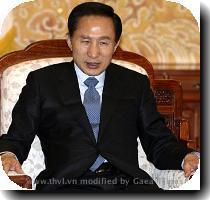South Korea hoists sunken warship, finds dead bodies of missing sailors
By Hyung-jin Kim, APThursday, April 15, 2010
SKorea hoists sunken warship, finds dead bodies
SEOUL, South Korea — South Korea lifted part of a warship from the sea Thursday, nearly three weeks after it mysteriously exploded and sank with dozens of sailors trapped inside. Salvage workers found dead bodies of 32 crew members in the retrieved vessel.
Fifty-eight crew members were rescued shortly after the 1,200-ton Cheonan split into two pieces after exploding March 26 during a routine patrol near the tense border with North Korea. So far, 34 bodies have been recovered, while 12 sailors remain unaccounted for.
Recovering the wrecked ship could help determine the cause of the blast. There has been some suspicion but no confirmation of North Korean involvement in the sinking. The disputed western sea border has in the past been the scene of three bloody inter-Korean naval battles.
On Thursday, a huge naval crane hoisted the stern portion of the ship — where most of the missing sailors are believed trapped — a day after divers succeeded in tying the wreckage with chains.
Rescuers and salvage workers later boarded the stern and found 32 bodies identified as Cheonan crew, according to the Joint Chiefs of Staff in Seoul. Divers had previously retrieved two bodies during an underwater hunt.
“It’s very regrettable as we hadn’t given up our hope until the last minute,” President Lee Myung-bak said during an emergency meeting on the salvaging, according to his office. “I don’t know how to console their families.”
Footage by TV broadcaster SBS showed rescuers and salvage workers searching the stern after it was hoisted above the sea surface and loaded onto a barge.
The stern was to be moved aboard the barge to a naval base to investigate the cause of the explosion while the remaining two-thirds of the ship is to be salvaged as early as next week, military officials said.
No cause for the blast has been determined. South Korean officials have said they will look into all possibilities including that the ship might have been struck by a North Korean torpedo or a mine left over from the 1950-53 Korean War. The conflict ended with an armistice, not a peace treaty, thus leaving the Koreas still technically at war.
North Korean officials have reportedly denied their country’s involvement in the blast. Last week, the Dong-a Ilbo newspaper in Seoul reported that North Korea military delegates told Chinese officials during their trip to Beijing that Pyongyang was not behind the ship’s explosion.
To ascertain whether North Korea was involved, authorities would have to look at the shape of broken ship parts and recover splinters of a torpedo or a sea mine and determine whether the North had such weapons, said Lee Hyun-yup, a marine engineering expert at Chungnam National University in South Korea. It could take years to find the exact cause, he said.
President Lee said the investigation must be made in a “through, scientific” manner, his office said.
The sinking was one of South Korea’s worst naval disasters. In 1974, a ship sank off the southeast coast in stormy weather, killing 159 sailors and coast guard personnel. In 1967, 39 sailors were killed by North Korean artillery.
South Korea has asked the U.S., Australia, Britain and Sweden to send experts for a joint investigation. A team of eight U.S. investigators, led by Rear Admiral Thomas J. Eccles, arrived in South Korea earlier this week, according to South Korea’s Defense Ministry.
Tags: Accidents, Artillery, Asia, East Asia, Koreas, Lee Myung-bak, North Korea, Search And Rescue Efforts, Seoul, South Korea, Territorial Disputes, Transportation



